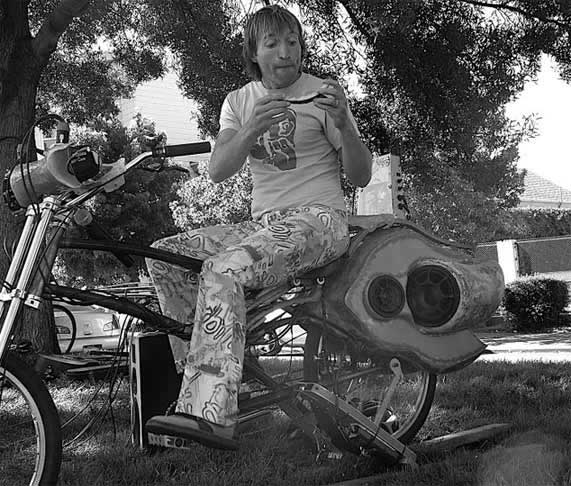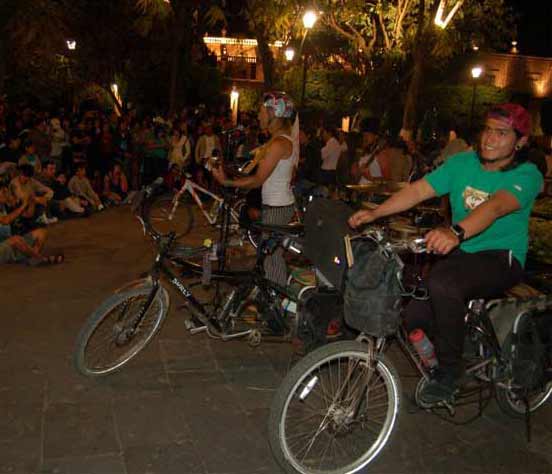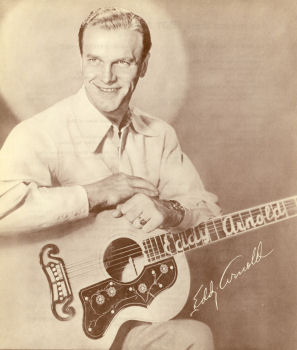A Convenient Truth: Pleasant Revolution
Bicycle Music Tour Advances ‘Ecological Amplification
By Travis McGee
Kipchoge Spencer, lead singer of the Ginger Ninjas, co-founder of Xtracycle and organizer of The Pleasant Revolution Bicycle Music Tour, takes a watermelon break but doesn’t leave his Xtracycle. Note the JBL PRX512M speakers mounted on the rear.
A new approach to energy conservation by bands on the road is being pioneered even as this is written, and it could hardly be more back-to-basics and environmentally friendly. How practical it is for others on the road is a whole other question. But we digress.
On Halloween 2007, the indie rock bands Ginger Ninjas and SHAKE YOUR PEACE! launched The Pleasant Revolution Bicycle Music Tour in North San Juan, CA. From the Sierra Nevada mountains through southern California, into Baja and eventually Mexico City, the team has played shows, recorded music with local musicians, and advocated a leapfrog-style transition to sustainable transportation.
During shows, two guitars, two vocal microphones and the bass are amplified through the portable audio system, which includes two JBL PRX512M loudspeakers halfway between the drummer and the two singers up front. To power the system itself, four Xtracycle bikes (elongated bicycles for extra carrying capacity) are set up in the air on kickstands, allowing the wheels to spin freely and turn a generator (a small DC motor run in reverse). The generator in turn goes into a capacitor to control the voltage. An indicator on the handlebars tells the "riders" (always volunteers from the audience) whether to pedal harder, cruise, or stop. The four capacitors feed a high-quality inverter, into which an eight-channel mixer and the two PRX512M loudspeakers are plugged, creating a 1,000-watt, portable, human-powered sound system.
The entire system is packed onto the Xtracycles for transportation between shows, a task that requires an optimal combination of power and light weight from the audio components. "When you are a traveling bike band, you also want music on the road," said Kipchoge Spencer, lead singer of the Ginger Ninjas, co-founder of Xtracycle and organizer of The Pleasant Revolution Bicycle Music Tour. "So I'm carrying one of the PRX512M speakers on the rear deck of my Xtracycle. With an iPod and a lightweight lithium phosphate battery [charged by a 26-watt folding Brunton solar panel], we have a 500-watt 'soul cycle' with amazing thump and brilliant attitude."
Although Spencer did not anticipate audiences to be larger than 300 people, crowd sizes have often reached 500. "The tour has been amazing so far, so much so that we extended it for a few more months," Spencer says. "We've been playing some really great shows, some planned but many just impromptu in the town plazas."
According to Spencer, the power efficiency of the PRX512M loudspeakers has contributed significantly to the success of the tour. "The PRX loudspeakers are the only speakers in the world that I'm aware of that could make this system possible," Spencer added. "Not only are they light, but the built-in amplification is efficient enough to make good use of our limited amount of human power. And they sound amazing. The hyper-efficient digital amplifier puts them in a class by themselves when it comes to ecological amplification. Whether or not you're a self-propelled bicycle road show, you should be using these speakers if you care about saving energy."
When asked about venturing beyond California and Mexico, Kipchoge replies, "I am hoping that we’ll make it to the East Coast before long, but don’t wait for us to get there to get yourself an Xtracycle lifestyle alteration!"
More information on The Pleasant Revolution Bicycle Music Tour is available at www.pleasantrevolution.net.
Fans picked at random supply the pedal power to gin up the portable audio systems providing the sound for the Pleasant Revolution Bicycle Music Tour
***
Crossing Over
EDDY ARNOLD: the beloved “Tennessee Plowboy” country-pop crooner, died on May 8 in Nashville following a lengthy illness. He was 89. His wife Sally preceded him in death in March. He is survived by two children, a son, Dickie, and a daughter, Jo Ann. In a spurt of activity in recent years, Arnold released new albums in 2002 and 2005 that showed he had not lost his touch with a mellow ballad, although the years had taken a toll on his once-smooth tenor. Still, his legacy includes 85 million records sold, 28 number one singles, 147 charting singles, and several acknowledged classics in the country-pop style he pioneered that was later dubbed “countrypolitan.” Melding of lush, string-rich arrangements with country rhythms supporting his avuncular, smooth vocals (once described by Dinah Shore as “warm butter and syrup being poured over wonderful buttermilk pancakes”), Arnold infuriated some country purists when he debuted his new sound in 1955 in “Cattle Call,” one of his signature hits, recorded in New York with the Huge Winterhalter Orchestra. His 1965 chart topper, “Make the World Go Away,” was about as perfect a recording ever made in the countrypolitan style, but from his first number one single, 1947’s “What Is Life Without Love,” he had a corner on heartbreak, which he probed in a wistful, tear-stained voice on memorable recordings such as “What’s He Doing In My World,” “Lonely Again,” “Turn The World Around,” “Lonely Again,” “Then You Can Tell Me Goodbye,” the deceptively sunny 1948 hit, “Big Bouquet of Roses” (in which he croons, “I’m sending you a big bouquet of roses” before turning the expected sentiment on its ear in the next line by adding a touch of blue to his voice as he sang, “One for every time you broke my heart…”), and one of Roger Miller’s typically clever tearjerkers, “The Last Word In Lonesome Is Me.” In 1946 he signed with Col. Tom Parker for management, and the following year dominated with 13 of the year’s top 20 country songs. After parting ways with Parker, Arnold later signed with manager Jerry Purcell (1964) and experienced another long ride of hits, beginning with “Make the World Go Away.” In his prime years he recorded with the cream of Nashville’s legendary session players, benefited from smart arrangements by Bill Russell and thrived under the direction of producer Chet Atkins. His voice and his songs took him from his home town of Henderson, TN, where he was born on May 15, 1918 to the stage of Carnegie Hall in New York and to venues in Hollywood, Lake Tahoe and Las Vegas, in a career of a half century’s duration. Away from the stage and the recording studio he lived a quiet, scandal-free life in the country, enjoying his family, friends and the great outdoors. He was proud of having broadened country’s audience with his pop-influenced work, and maintained a simple focus throughout a distinguished career. “All I’ve ever looked for is good songs,” he once told a reporter. “Music that touches people’s heart.”
DAN FEDERICI: April 17 brought the sad news that E Street Band keyboardist Dan Federic had died at New York’s Memorial Sloan-Kettering Cancer Center following a long battle with melanoma. He was 58. He had last performed with the band on March 20, in Indianapolis. On his website Springsteen eulogized Federici as “the most wonderfully fluid keyboard player and a pure natural musician,” with whom he had worked for 40 years. “I loved him very much. We grew up together.” Federici first hired Springsteen for his band, playing the Asbury Park clubs; in 1969 he joined Springsteen's band Child, and never left the Boss’s employ. Self-effacing on stage and off, he earned the nickname “Phantom Dan,” but he spoke soulfully and memorably through his instruments, especially so with his graceful, winsome accordion support on “4th of July, Asbury Park (Sandy),” and a dramatic organ coda on “You’re Missing,” from Springsteen’s 9/11-inspired 2002 album, The Rising. He found where he belonged in Springsteen’s music, and he stayed right there, steady and reliable, always at home.
SEAN COSTELLO: Found dead in his Atlanta hotel room on April 15, the day before his 29th birthday, blues guitar master Sean Costello had accomplished much in his short time in the spotlight and had earned the respect of contemporaries and blues elders alike. At age 17 he released his first album, Call the Cops, and Real Blues Magazine hailed it as “an explosive debut.” His 2000 album on the Landslide label, Cuttin’ In, racked up enthusiastic reviews and a W.C. Handy Award nomination for Best New Artist Debut. Subsequent albums—Moanin’ For Molasses in 2002, Sean Costello in 2005—found him expanding the blues lexicon into realms of funk, rock and soul. At the outset of his career he had a fruitful association with Susan Tedeschi, touring with her and adding some stirring guitar statements to her Just Won’t Burn album, which was eventually certified Gold. At his death he was looking ahead to new challenges as an artist who had been defined by his guitar work He told a reporter, “I love playing the guitar. As a kid I was definitely obsessive over the instrument, and for years I felt I could express myself better through the guitar with my own voice. But right now I’m equally driven towards writing songs and expanding my vocal direction.” Cause of death was undetermined at press time.
JERRY WALLACE: Singer Jerry Wallace, whose sonorous baritone voice fit neatly around both pop and country songs, died of congestive heart failure in Victorville, CA, on May 5. He was 79. Born in Guilford, MO, Wallace moved to Hollywood and made his first recordings for the Allied label in 1951. It would take him seven more years to score a chart hit, with 1958’s “How Time Flies,” but once established he made the most of his moment. In 1959 his dramatic reading of "Shutters and Boards," a heartbreak ballad written by the war hero and film star Audie Murphy, spurred the single to sales of a million copies. Wallace was blessed not only with a beautiful crooner’s voice but with an impeccable sense of the song, of knowing when and how to turn a phrase to achieve a desired emotional effect or to shade a lyric in order to underscore the drama suggested in arrangements fashioned around rich strings and small combos. His 1964 hit, “In the Misty Moonlight,” is pop love balladry of the first order. His last chart hit was 1972’s “The Tune in Dan’s Café,” first featured on an episode of the Rod Serling-produced TV show Night Gallery and subsequently a number one country single and Top 40 pop item. By the late ‘70s he was effectively retired as a performer and recording artist, although he occasionally performed for Victorville veterans groups (a Navy veteran, Wallace had served in World War II himself). In toto, 45 of his singles made it onto the pop and country charts.
THE BLUEGRASS SPECIAL
Founder/Publisher/Editor: David McGee
Contributing Editors: Billy Altman, Derk Richardson
Logo Design: John Mendelsohn (www.johnmendelsohn.com)
Website Design: Kieran McGee (www.kieranmcgee.com)
Staff Photographers: Audrey Harrod (Louisville, KY; www.flickr.com/audreyharrod), Alicia Zappier (New York)
E-mail: thebluegrassspecial@gmail.com
Mailing Address: David McGee, 201 W. 85 St.—5B, New York, NY 10024
Founder/Publisher/Editor: David McGee
Contributing Editors: Billy Altman, Derk Richardson
Logo Design: John Mendelsohn (www.johnmendelsohn.com)
Website Design: Kieran McGee (www.kieranmcgee.com)
Staff Photographers: Audrey Harrod (Louisville, KY; www.flickr.com/audreyharrod), Alicia Zappier (New York)
E-mail: thebluegrassspecial@gmail.com
Mailing Address: David McGee, 201 W. 85 St.—5B, New York, NY 10024




